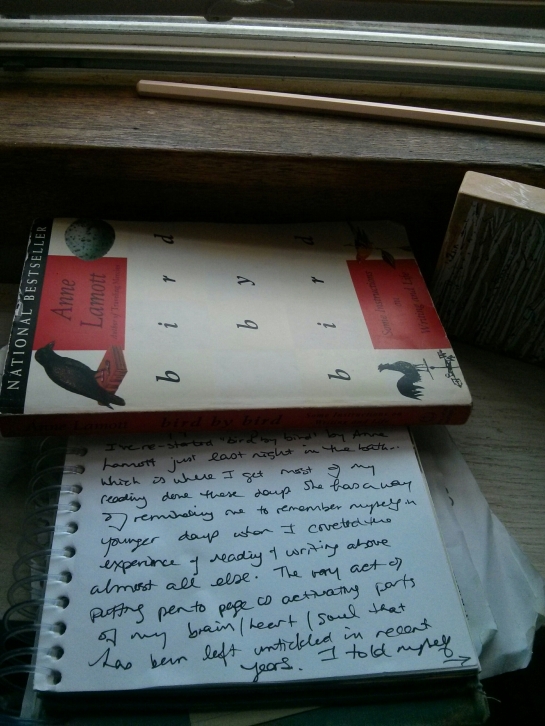For a whole generation of digital natives, who have known and used the Internet since we were at least teenagers, the concept of sharing our thoughts, ideas, and experiences and getting immediate feedback holds no surprise. But does someone ‘liking’ our Facebook status or ‘@ replying’ to Twitter updates actually give us the feeling we crave from the act of sharing? What would happen if the sharing of our stories could be rewarded with smiles, laughter, or even applause from more than a hundred listeners?
At Grownups Read Things They Wrote as Kids (GRTTWaK), this is a distinct probability. In the back room of The Garrison, thirtyish-year-old urbanites sit on folding metal chairs, sipping expectantly on locally brewed beer. Excited chatter rings through the crowd, while those who are there solo scroll through updates on their smart phones.
Dan Misener, media and tech guru for CBC, who created the “unstoppably rad” open-mic reading series, begins to speak before his microphone is on. He pauses, and the crowd is unbelievably quiet in anticipation. The balance of veterans and newcomers at GRTTWaK 11 is fairly even, though slightly more of the audience is hearing Misener’s introduction for the first time. Misener explains that the night will be exactly what it sounds like: adults reading things that they wrote when they were kids. The rules are simple: you must “have been the kid that wrote the kid-writing” and it must be short. In fact, the audience literally cheers for the 5 minute limit, to which Dan quips, “Everyone’s very very excited about the concision!?!” The definition of “kid” really depends on the person, and it ranges from the very young, to the post high-school years.
Surprisingly hilarious, the readings are reflections of the presenters’ kid selves, or rather, those selves they think are comical or interesting to a crowd. We hear letters to pets and parents from summer camp, short stories about animals that cause earthquakes, and aliens from the year 4694. We listen to captions that accompany big, bold illustrations, to diary entries and to love notes about passionate crushes on British pop stars. There are new renditions of old classic girl-detective novels, poems about sports victories, lists of teenage hatreds and adorations, and long, flowery descriptions of selves inspired by favourite authors. There’s a “re-imagining of the Resurrection,” and even the last will and testament of a nine year old! One writer’s line from her journal said, “this will most likely sound silly in a few years… but I just don’t care!” This really captured the feeling in the room that night. We didn’t care: the more unedited, grammatically mistaken, and run-on-sentencey, the better! The less confident, prepared and practiced, the funnier!
The selection process for GRTTWaK excerpt-selection is similar, though more discerning by necessity, to the one we all use when deciding what is worthy of a Facebook or Twitter update. When we post to our social networks, we’re presenting a version of ourselves that we want to show others, and we are quite aware that such updates are read by many, and could be for years. But we’re not just presenting our opinions; we’re sharing our existence. We want to tell people where we are, what we’re doing, who we’re with, what we’re wearing; our everything about our every moment. A quick search for the #GRTTWaK hash tag on Twitter, confirmed my bet that at least one Blackberry or i-phone in that backroom sent out a status about being there, and linked in people who were there with them. This constant need to share with others can be isolating, especially since the medium — our computer or smart-phone — is such a private possession. We’re doing all this online sharing with and for others, but in actuality; we’re doing it alone.
Misener tells me “events like this do not ‘scale up.’ They rely on the enforced intimacy that people are missing and craving.” We want to see how our experiences make us similar to others, rather than unique. GRTTWaK has found a market of sharers that actively use online social networks, yet yearn for something more, something tangible. The hand-written journal entries read aloud take on the quality of story telling, the sharing of the kind of un-vetted personal histories that are normally saved for our closest friends and family members.
The night is rewarding for the presenters because they get instant validations of their experiences, and equally rewarding for the audience because of the sense of camaraderie in the collective mocking of our past selves. Besides being full-body-laughing fun, GRTTWaK reminds us of a time when we chronicled our days and shared our thoughts in more than 140 characters. We begin to remember when our faces weren’t lit by a pale shade of blue as we journaled. For people to learn something about us they had to ask us questions, or be around us while we told stories about ourselves.
Unfortunately for GRTTWaK fans, the next one isn’t until 2013, as Misener and his lovely lady are moving to France for a year or so. When I shared my dismay about the hiatus, Misener reminded me that his re-location doesn’t stop the tradition from continuing. Open-mics happen on a nearly nightly basis in Toronto. A little bit of organizing and some effort to let people know about the theme, and GRTTWaK — or its yet-to-be-named cousin — can continue its ability to let us share things and feelings in ways that Facebook and Twitter cannot.
At the very least, this layover will have many of us scouring our parents’ basements for our dossiers and journals to re-experience — and possibly curate — our own kid-self written past. But let’s be honest with ourselves, we’ll probably post the funniest finds to at least one of our social networks.

I stole this image from blogTO





